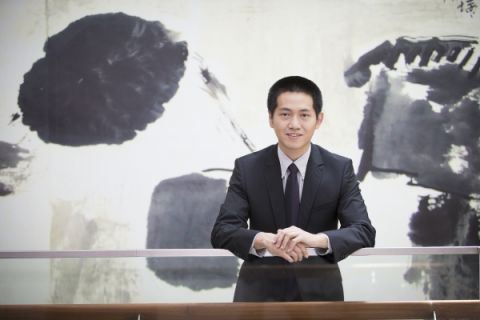
By Alvin Lee
SMU Office of Research & Tech Transfer – In a January 2019 article published in Scientific Reports, Sean Lee, a PhD student at the SMU School of Social Sciences (SOSS), presented findings of a study showing that people who tended to notice and appreciate the positives in life were physically healthier vis-à-vis their more negative counterparts.
The study, which Lee co-authored with SMU Lecturer of Psychology Andree Hartanto, found that people with lower socioeconomic status (SES) tend to have higher levels of interleukin-6, a protein that the body produces to regulate immune responses to ailments ranging from inflammation to cardiovascular disease. However, those who display high levels of gratitude in a survey that measures agreement to questions such as “I have so much in life to be thankful for” do not have “that spike in interleukin-6 even though they have lower levels of SES after controlling for relevant demographic variables”, Lee tells the Office of Research and Tech Transfer.
“There actually are interventions that can foster a sense of gratitude, such as keeping a daily gratitude journal diary,” says Lee. “How enduring those interventions are is something that’s yet to be answered. But we postulate that perhaps using such interventions may aid people who are less fortunate in terms of SES to better cope with physical ailments and improve their overall physical health.”
Being creative and multi-disciplinary
The theme of human psychology affecting behaviour is a consistent thread through Lee’s work, including his PhD dissertation titled “Boosting Creative Ideation Through Improving Self-Regulation”. Self-regulation, Lee elaborates, “pertains to whether one is able to inhibit one’s natural impulses, which encompasses behaviours, thoughts, and even emotions”. With regard to creativity, he says:
“I propose that mental self-regulation is needed to prevent oneself from being unwittingly bounded by conventional thoughts and perspectives, which are typically highly salient in our minds and restrict our ability to creatively explore novel ways of thinking. I then examine if glucose consumption and mindfulness meditation – interventions that have been shown to improve our ability to self-regulate – could boost our creativity.”
“If you’re tasked to design a table creatively you might want to move away from designing one with four legs,” he explains. “You could go with just one leg or even no legs – the whole block of wood could be the table. You want to think of the material to be used. Why must it be wood?
“Forgo the conventional ideas, move away from them, and explore more creative means.”
As someone trained in industrial and organisational psychology, Lee acknowledges that he has been focused on the business application of the discipline, but the 27-year-old is far from being single-dimensional. On top of winning this year’s SMU Presidential Doctoral Fellowship Award for outstanding research performance, Lee also won the Multidisciplinary Doctoral Fellowship Award for exemplary multidisciplinary research output.
“I have always held a firm belief that an interdisciplinary approach is imperative to the advancement of scientific research,” says Lee, who expects to complete his PhD programme in 2020. “I believe that all domains of knowledge are inter-related to a certain extent and it is only through integration and synergy of multiple disciplines and perspectives that we are able to obtain a holistic and nuanced understanding of an issue or phenomenon at hand.
“Hence, in my quest of advancing knowledge in my core research areas, I have often considered and adopted methods and knowledge from other specialisations within my discipline (e.g., cultural psychology, clinical psychology, etc.), as well as disciplines outside of psychology altogether (e.g., medical biology, public health, etc.).”
That approach has led Lee to reach out to different Professors for their specialty. Lee credits his PhD advisor, SMU Associate Professor Angela Leung for her help on research, writing, and networking skills, and Associate Professor William Tov for the ‘pointer knowledge’ strategy, which he elaborates as follows.
“In essence, I need not commit every single detail in each article to memory and I should prioritise information by relevance,” Lee explains, recalling being overwhelmed by the amount of coursework reading and research commitments in his first year of PhD study. “For information that are momentarily less relevant, it suffices to know them in gist and… read up more on them whenever they become more pertinent.
“This piece of advice drastically changed the way I read and organise information and has helped me to cope well through my early years in the program when coursework was heavy.”
A PhD student’s life
Given the heavy workload, one might expect Lee to have little free time beyond eating and catching up on sleep. Instead, he has won the PhD Student Life Award for two consecutive years, organising everything from farewell parties to trips to the bowling alley that gives lie to what he describes as Psychology PhD students’ “notorious reputation for being reclusive and unwilling to engage in any non-academic activity”.
“Engaging in such activities not only serves as a break from work for me, but also adds substantive meaning and vibrancy to my otherwise long and arduous PhD student life,” Lee elaborates, pointing to eSports competitions and volunteering stints that he has also taken on. “It’s something that’s contradictory. On one hand I would like to protect my health and treat myself better, but on the other hand I always try to pursue more things. A lot of the things I do are inherently interesting to me.
“But while I’m enjoying myself, my body may not be enjoying it as much. I always have to be cognisant of the fact that I shouldn’t be pushing myself too far. This is something that’s an internal struggle, and I’m trying to strike a better balance.”
And what would he say to prospective post-graduate students making the jump to a PhD programme?
“You will be successful only if you have an inherent drive for research,” he states matter-of-factly. “If you have a high level of intellectual curiosity and you want things answered, and you have a theory about how things work, and it excites you to have an opportunity to test that hypothesis, it would serve you very well in this programme.”
He concludes: “You need to be proactive. If you’re proactive and reach out to different Professors, you get to learn from them. Every Professor has his or her own strengths and expertise, and I believe if you’re able to coalesce such varied learning experiences together it’ll greatly enhance your overall research ability and output.”
Back to Research@SMU Nov 2019 Issue
See More News
Want to see more of SMU Research?
Sign up for Research@SMU e-newslettter to know more about our research and research-related events!
If you would like to remove yourself from all our mailing list, please visit https://eservices.smu.edu.sg/internet/DNC/Default.aspx

